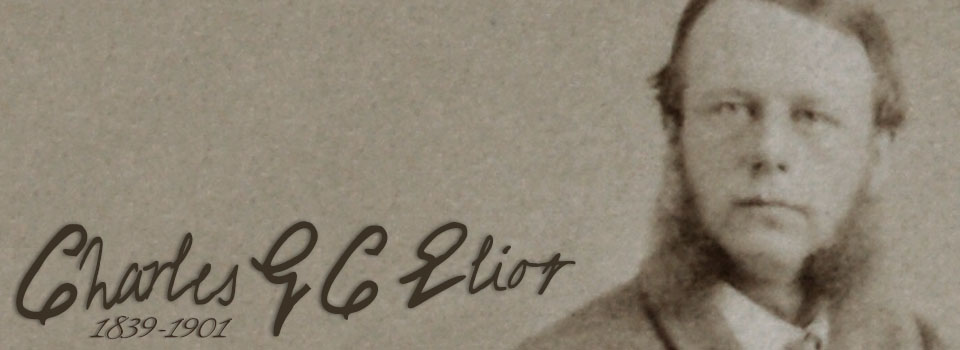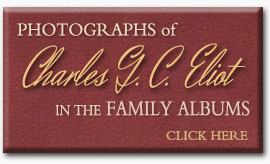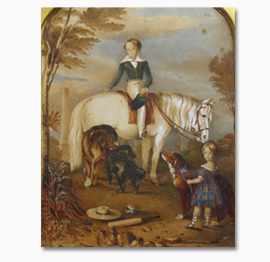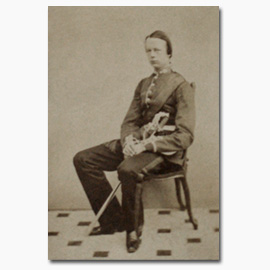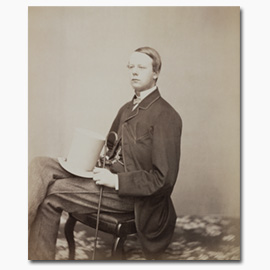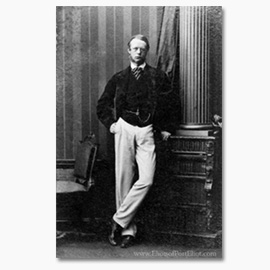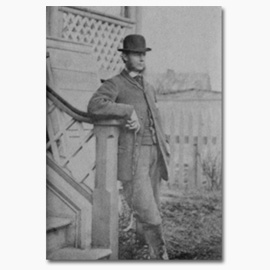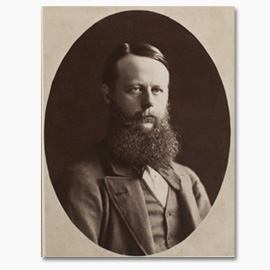Charles George Cornwallis Eliot (1839 - 1901)
Charles was the eighth child and sixth son of Edward Granville Eliot and Jemima Cornwallis, known to family and friends as Charlie.
I have not finished writing the full biography for Charlie Eliot, so the text below includes some newspaper transcriptions and quotes that offer basic information and insight into his character. An in-depth biography will be added in the future.

("Morning Post" Saturday, 5 Oct 1839)
Lord Eliot is prevented from visiting Port Eliot, in Cornwall, during the autumn, by the approach of the period for the confinement of Lady Jemima.
("Exeter Flying Post" Thursday, 24 Oct 1839)
On the 16th inst., in Dover Street, Lady Jemima Eliot, of a son.

Unlike the rest of his siblings, no childhood letters (written by Charlie) appear to have survived in the Port Eliot collection. It's very likely that he would have given these to his own children, so tidbits about his childhood must be gleaned from letters written by his siblings.
Charlie was dearly loved by all his older siblings, but he grew up quite on his own, since he was so much younger. He had some kind of speach impediment, as well as a recurring illness, throughout his childhood, so he was later than all his brothers in attending school. He enjoyed time at Port Eliot, time with his aunts and cousins and was special friends with the family friend, Dr. Alfred Burton.
One of his particular interests was Heraldy, and this was evidenced by a lovely dedication in the front of Sir Bernard Burke's 1860 volume, "A Selection of Arms by the Laws of Heraldry" –
To My Friend,
The Hon. Charles G. Cornwallis Eliot,
of the Grenadier Guards,
This Volume is Inscribed,
In Token of My Regard and In Memory of the Interest
He Used to Take in
"The Gentle Science" of Heraldry.

[The following group of quotes comes from the journal of Mrs. Frances Monck, who was the wife of Lieutenant-Colonel Richard Monck of the Coldstream Guards. They were part of the group of Guardsman stationed in Canada in 1862, as was Charlie Eliot. These memories of him add a personal touch to his character!]
("My Canadian Leaves: An Account of a Visit to Canada in 1864-1865" by Frances Elizabeth Owen Monck, 1891)
Page 26: Mr. Godley made me talk French to him; he is a nice agreeable old man. Sir Etienne is the only Queen's A.D.C. in Canada or America. He met Captain Eliot with the Prince of Wales, when he was here, and said to me that Captain E. is "un bien joli garcon."
Page 250: Tuesday, 10th. [January 1865] — . . . We then went to the rink, where the R.A. band was playing, and we saw some exquisite dancing on skates. . . . Poor Captain E. was struggling alone on skates, working his arms like a wind-mill, and looking broken-hearted.
Page 257: Saturday, January 14th. [1865] — . . . [Yesterday] After dinner I dressed for the rink ball . . . When we arrived, I was struck with the very pretty and novel sight; the rink was lit with gas, and decorated with flags and ornaments; there were tables with refreshments on the ice, and the 25th band was playing. It looked like a fair in a Dutch picture; most of the firls wore very short red petticoats, and grey or black dresses; some wore scarlet, and some white feathers in their fur caps, and most of the officers wore their mess uniforms.
. . .Captain E. I spied in his mess uniform with the saddest face, teeth set, and arms like a wind-mill, struggling on alone, heeding no one, and looking as if nothing but death could stop him. All the time the others were dancing quadrilles, lancers, or valses, there he was steadily tearing round the rink alone, sometimes knocked against, but always righting himself, and looking as awkward as possible. He looked like a person shuffling along with slippeers too large for him; do you know what I mean?
Page 278: Thursday, 2nd. [February 1865] — Yesterday was a heavenly day. The G.G. says to me every day, "Now, what do you think of the Canadian climate?" Dick and I went to the rink, where the 17th band played. There were many spectators, but few skaters. Captain E., in uniform, was there, shuffling round and getting on better than before.
Page 280: Saturday, February 4th [1865]. — . . .After dinner we went to the children's ball at the rink; it was given by the boys of the High school under Mr. Hatch, the clergyman. The boys issued six hundred invites! Mr. Hatch said it taught them how to manage, as they formed a committee and appointed a secretary for the occassion. There was a tremendous crowd. Mr. Hatch stayed with us most of the evening. He introduced the secretary boy to Dick. The boys were so civil, offering food and drink, and flying about on skates with cakes and wine and water. Poor Captain E. was almost an illustration of perpetual motion. There he was in red uniform (the only red man there), shuffling round, never stopping; he was like the brook, running on "for ever." At last he shot himself up against the wall, which he held till he shuffled over to me. He said, "It is not that I want to go on so long, but the fact is, I can't stop, once I set off; the more I try to stop, the more I go on." He said "I am taking care of a little girl to-night, but she skates so much better than I do that I need not think of trying to catch her." . . . To return to the rink! Captain E., after sitting with me said, "Now I think I must go, to look after my little chaperone," meaning his little charge! He managed at last to capture her.

("Western Morning News" 23 May 1901, page 5)
DEATH OF COL. THE HON C. ELIOT.
Our London correspondent, telegraphing at a late hour last night, says:—
Many persons in Cornwall and elsewhere will learn with deep regret of the death of Colonel the Hon. C.G. Cornwallis Eliot, brother of the Earl of St. Germans. He was well known in Society, and was a favourite at Court, where he occupied a distinguished position and enjoyed the confidence of Queen Victoria, who held him and all his family in the highest esteem. The gallant officer was a fine type of the English gentleman — tall, soldierly, frank, and sincere. He was admired and loved by all who knew him. He was of a retiring disposition, otherwise a man of his ability might have gained wider popularity. Colonel Eliot married the sister of the present Lord Wimborne, a lady who has the reputation of being the cleverest lady in Society, and one of the finest amateur pianists. The colonel was for some years in the Grenadier Guards, but on his marriage retired, though he did not entirely sever his connection with the service, and for many years took an active interest in the Cornwall Militia.

("Royal Cornwall Gazette" 30 May 1901, page 7)
DEATH OF COLONEL THE HON. C. G. ELIOT.
The Hon. C. G. Cornwallis Eliot, younger brother of the Earl of St. Germans, whose death we announced last week, was a singularly handsome man, and also a man of beautiful character with high qualities of heart and mind. His great natural gifts would have enable him, if he had chosen, to have played a conspicuous part, but he was content to live a comparatively retired life. He was a well-known figure in Society, and was in high favour at the Court. Colonel Eliot was married to a sister of Lord Wimborne. He was the son of the third Earl of St. Germans, and was born in 1839. After leaving Eton he became lieutenant, and subsequently captain, in the Grenadier Guards. He was hon. colonel of the late 3rd Battalion Duke of Cornwall's Light Infantry, and was Gentleman Usher Daily Waiter to the King, and Comptroller and Equerry to Prince and Princess Christian of Schleswig-Holstein. Colonel Eliot had been ill for some time, and died on Wednesday night, the 22nd ult., at ten o'clock. During his illness constant inquiries were made as to the progress of the patient by the King and Queen and Prince and Princess Christian.
The colonel's health had been failing of late. Two years ago he had an attack of typhoid fever, and after his recovery he went to Brighton for some little time, it being hoped that he had benefitted by the change, but this was not the case to any extent. The colonel has, in fact, never been quite himself since the typhoid left him, and he eventually succumbed to peritonitis.
The deceased leaves a widow, five sons, and two daughters— Mr. J.G. Eliot, bank manager, Malvern; Mr. Montague Eliot, director of the Alliance Assurance Company, London; Mr. Christian Eliot, architect, London; Captain Ernest Eliot, in South Africa with the forces; Mr. Howard Eliot [sic – should be Edward], student at Oxford; Miss Eliot and Miss Evelyn Eliot. The two last-named reside with their mother at 8, Onslow Gardens, S.W. The deceased was for many years a magistrate of Cornwall, and ever since he was commissioned to the Peace had been regular in his attendance upon the Bench when in the county. For a long time he was President of, and a generous donor to, the St. Germans Horticultural Society, never failing when possible to put in an appearance at the annual exhibition. The colonel's genial disposition, easy manners, and love of sport greatly endeared him to the tenantry, who looked forward with pleasure to his visits with the Earl, especially during the shooting season.
THE FUNERAL.
Amidst numerous tokens of sympathy and sorrow, the funeral of Colonel the Hon. Charles George Cornwallis Eliot took place at St. Germans on Saturday. Conveyed by rail from the metropolis on the previous day, the body, enclosed in a lead shell, with oak case and brass mountings, lay overnight in the hall of Port Eliot House, large candles, supported by silver candlesticks, placed at the head and foot of the coffin, being kept lighted throughout the night. Within a few minutes of noon on Saturday the cortege left the mansion for the church, which stands within the grounds of Port Eliot and almost adjoins the house. At the head of the procession walked in a long line the labourers and mechanics employed on the estate, and the coffin, on which was a simple spray of flowers, was carried to the church by emplyees on the estate. In front of the bier were the officiating clergymen in their robes, and hebind walked the relatives and personal friends.
In the church were already assembled the tenantry of Port Eliot and a large congregation of villagers and others. As the body was borne in through the Norman porch down the central aisle and deposited in the chancel, the organist, Mr. Glendinning, played Beethoven's Funeral March. For the mourners seats were reserved in the choir stalls, and along the front of the chancel were temporarily placed a large number of extremely beautiful floral tributes. Rev. K. Sheppark, sub-dean of the Chapel Royal, Windsor, conducted the service, assisted by the Revs. W. Westmacott (vicar), H.N. Wheeler (Hessenford), and D. Jenkins (Tideford). After the opening sentences, read by the vicar, the hymn, ‘Far from my heavenly home,' was feelingly sung by the choir and congregation. The Psalms appointed by the burial service were impressively chanted by the clergy and choir, and the Rev. E. Sheppard read the lesson, the service in the church closing with the hymn, ‘Hark, hark, my soul, angelic songs are swelling.' As the cortege again left the sacred building the organist played Chopin's ‘March Funebre.' From the church to the cemetery, on the hillside overlooking the village, the body was borne alternately by representatives of the tenantry and estate workmen, the route being taken through the grounds of Port Eliot by the principal drive, the cemetery gate being nearly opposite the lodge entrance. Outside the church the cortege was joined by the tenantry and villagers, who took up their position behind the mourners, and with them proceeded on foot. At the cemetery the Rev. E. Sheppard impressively read the closing prayers, the interment taking place in the family vault.
The chief mourners were the Hon. Mrs. Eliot (widow), the Earl and Countess of St. Germans (brother and sister-in-law), Mr. Granville Eliot, Mr. Montague Eliot, and Mr. Edward Eliot (sons), Mr. and Mrs. Christian Eliot (son and daughter-in-law). Miss Eliot and Miss Evelyn Eliot (daughters), Viscount Duncannon, Hon. Cyril Ponsonby, Hon. Arthur Ponsonby and Hon. Walter Ponsonby (nephews), and Mr. J. Bevil Fortescue (cousin). Other mourners and friends included Lord St. Levan, Lord Kingsale, General Sir Reginald Pole-Carew, Hon. Athol and Mrs. Liddell, General Jago Trelawny, Admiral Sir Alexander Buller, Colonel and Mrs. Wodehouse, Mrs. Westmacott, Mr. C. Westmacott, Mr. E. St. Aubyn, Mr. W.D. Boger, Colonel Borlase Childs, Mr. and Mrs. A.K. Boucher, Captain Reginald Parlby, Canon Aldham, Canon Bush, Canon Hammond, Rev. G. Pole-Carew, Mr. J. Littleton, Mr. R.G. Rowe (Helston), and Mr. Bedford Kerswill. Representing the tenantry of Port Eliot were Messrs. R.E. Paige, J.S. Tucker, E. Tucker, R. Banbury, W. Paige, J. Raby, W. Coad, J. Palmer, W.F. Creber, G. Matthews, sen., G. Matthews, jun., Mortimer G. Bray (3), C. Stanton, E. Body, H. Maynard, B. Stephens, F. Carpenter, Hocking, R. Oliver, W. Brenton, W. Mitchell, J. Couch, H. Couch, S. Blake, and H. Polgreen. Among others present or grouped round the graveside afterwards were Messrs. J.W. Lawry, B. B. Trast (Menheniot), R. Elford, C.J.G. Allin, F.J. Pearce, W. Pearce, G. Brenton, H. Brenton, J. Hancock, Read, Cross, J. Scantlebury, G. Scantlebury, Goard, Garland, J. Hobbs, W. Stevens, J. Hawke, Mrs. Hobbs, Mrs. Trudgay, Mrs. Cox, Mrs. Scantlebury, Miss Sarah Lavers, and Nurse Judkins. Telegrams regretting absence were received from Prince and Princess Christian, the Earl of Mount Edgcumbe, and Viscount Valletort, the two latter being on the Continent.
Among the floral tributes, their Royal Highnesses Prince and Princess Christian sent ‘With sincere regard and friendship,' a beautiful wreath composed of lilies of the valley, arum lilies, and stephanotis. Another very beautiful tribute bore the inscription ‘With deeply felt regard and tenderest remembrance from H.R.H. Princess Frederica and Baron Pawel Rammingen.' Other wreaths and crosses, many of them accompanied by touching expressions of sympathy and affection, were sent by the children and grand-children of deceased, the Earl and Countess of St. Germans, the Earl and Countess of Bessborough, Lady mary and the Hon. Walter Ponsonby, the Earl of Mount Edgcumbe, Lady Ernestine Edgcumbe, Lord Eliot and the Hon. John Eliot, Colonel Sir Algernon and Lady Nield, Lady Vivian, Countess of Lindsey, Lieut-General Coote Hughcinson, Lord and Lady St. Levan, Lady Katherine Parker, Lord and Lady Oranmore, Mr. and Lady Kathleen Skinner, Viscount and Viscountess Duncannon, Colonel Lloyd and officers 3rd D.C.L.W., committee Royal Albert Orphan Asylum, children in the Royal Albert Orphan Asylum, Mrs. Lawson Johnson, Mabel Ramscden, Mr. and Mrs. W. Johnster, Mr. Montague Guest, Mr. and Mrs. Thomas Ridley, Mrs. Burrowes, Peter and Penelope Westmacott (‘his god-children'), Bedford and Elisa Kerswill, Mrs. and Miss Ross, Mrs. Wills, Mr. L. Dick Cunyngham, Mr. Otto Goldschmidt, Mrs. F. Hamilton, Major Vigor, George and Constance Gordon, Bessie and Albert Wodehouse, Frederick and Frances Thesiger, Mr. E. St. Aubyn, Mr. and Mrs. W. Kersiwll, Mrs. A. Finlay, Alfred Burton, Mrs. Tremayne (Morval), Mrs. Forescue (Boconoc). Mrs. Anderson, Mrs. Cecil Chapman, Mr. and Mrs. H. Peck, and servants at Cumberland Lodge, and 8, Onslow Gardens. Mr. Allin and Mr. George Brenton arranged the order of procession and superintended the local arrangements.
MEMORIAL SERVICE IN LONDON.
A memorial service, concurrent with the obsequies of the Hon. Chas. Eliot, was held on Saturday in the Church of St. Andrew's, Wells-street, Marylebone, W., which was very largely attended. Rev. W.T. Houdsworth, the vicar, officiated, assisted by Rev. C. Sparros Simpson, M.A., and Rev. J.W. Lewis. The service was impressively rendered. The sentences were sung to Croft's music, the Psalm being ‘Domine Refugium.' Two hymns were sung— ‘Hark, hark, my soul,' and ‘Far from our heavenly home.' Goss's ‘I heard a voice,' and Spohr's ‘Hail, Lord Almighty, hail,' were the anthems. The following were present:– Colonel Carrington (representing the King), Colonel Alfred Egerton (representing the Duke of Connaught), the Hon. T.L. Colborne (representing Princess Henry of Battenberg), Major Evans Marsh (representing the Prince and Princess Christian), Lord and Lady Wimborne, Viscount and Viscountess Clifton, General and Mrs. Henderson, Mr. W.H. Dawson, Colonel Branston, Mr. E. Savile, Mrs. G. Savile, the Hon. Mrs. Cuttie, Mrs. Bradshaw, Mrs. Chapell Hodge, the Hon. J.J. Bourke, Lieut.-Colonel Clarke Jervois, Mr. and Lady Kathleen Skinner, Lady Oranmore and Browne, the Hon. Irene Ponsonby, Mr. A.M. Lecluse, the Countess of Bessborough, Lady may Ponsonby, the Hon. Mrs. Cyril Ponsonby, Viscountess Duncannon, Lord and Lady William Seymour, Mrs. Kathleen Somerset, Lady Houston Stewart, Major the hon. J. and Lady Edith St. Aubyn, Sir Erye Massey Shaw, Miss Shaw, the Hon. John Boscawen, Colonel the Hon. Sir William Colville, Mr. Raglan Somerset, Mr. Ralph Dalyell, C.B., the Hon. Mr. and Mrs. Richard Strutt, Lady St. Levan, Lady Agnes Townsend, the Hon. Mabel St. Aubyn, Colonel the Hon. E. Dawson, Archdeacon Baly, Mr. F. Simmonds, Lord Glenock, Countess Beauchamp, Lady Maud Lygon, the Rev. Ernest and the Hon. Mrs. Villiers, Lord and Lady Raglan, Sir Jardine Engelheart, Lady Layard, Mr. Alderson, Lady Ellis, Mr. George Grant Gordon, Mr. and Mrs. Edward Stanley, and the Hon. Alexander Yorke.


Four portraits of Charles Eliot are still in the family collection at Port Eliot – the earliest being a small watercolour by an unknown artist in the 1840s. Another is a larger portrait by Edward Opie (painted c. 1879), one of a pair – the other portraying Charles' older brother, Henry. The third portrait is a small watercolour by Deighton (undated). The last was a posthumous portrait by Miss Graham, painted in 1902. Again, this is one of a pair, the other portraying Charles' wife. Charlie and his family were very keen amateur photographers, so many photographs of him survive in the family albums.
